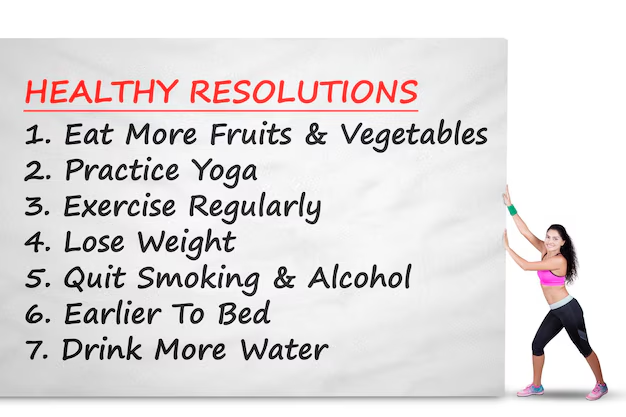
In our busy, modern world, it’s easy to get caught up in the hustle and bustle of everyday life, leaving our health on the backburner. However, adopting a healthy lifestyle doesn’t have to be complicated or time-consuming. Small, intentional changes can make a big difference in your overall well-being. Whether you’re new to fitness or looking to enhance your nutrition, this guide will provide you with simple, actionable tips to improve your health.
1. Start With Simple, Consistent Movement
Fitness doesn’t require fancy gym equipment or hours spent at the gym. The key to staying fit is consistency. You can start by incorporating movement into your daily routine. This could be as simple as taking a brisk walk during your lunch break, doing a quick bodyweight workout at home, or using a fitness tracker to monitor your steps. Aim for at least 150 minutes of moderate activity per week, which could be spread out over several days. If you prefer, try combining different activities such as walking, cycling, or yoga to keep things interesting.
2. Incorporate Strength Training
While cardio exercises like walking and running are great for your heart, don’t overlook the importance of strength training. Strength training helps build lean muscle mass, boost metabolism, and improve bone health. You don’t need a gym membership to get started—bodyweight exercises like squats, lunges, push-ups, and planks can be done anywhere. If you want to challenge yourself further, you can incorporate dumbbells, resistance bands, or kettlebells into your routine.
3. Fuel Your Body with Nutrient-Dense Foods
A balanced diet is essential for overall health and wellness. Instead of focusing on restrictive diets or quick fixes, aim to include a variety of nutrient-dense foods in your meals. These foods provide the vitamins, minerals, fiber, and antioxidants your body needs to function at its best. Fill your plate with a colorful array of fruits and vegetables, whole grains like brown rice and quinoa, lean proteins such as chicken, tofu, or fish, and healthy fats like avocados and olive oil.
Start by making small changes to your diet, such as swapping refined grains for whole grains or adding more plant-based meals to your weekly menu. Eating a variety of foods will help ensure that your body receives all the nutrients it needs for optimal health.
4. Practice Portion Control
Even healthy foods can lead to weight gain if consumed in excess. One of the easiest ways to manage your diet is through portion control. Instead of focusing on strict calorie counting, aim to listen to your body’s hunger cues. A great tip is to use smaller plates and bowls to help prevent overeating. Additionally, try eating more slowly to allow your body time to signal when it’s full. This will help you avoid consuming unnecessary calories and will promote better digestion.
5. Stay Hydrated
Water is essential for life and plays a critical role in everything from digestion to energy levels. Many of us forget to drink enough water during the day, especially when we’re busy. Aim to drink at least 8 cups (64 ounces) of water per day, or more if you’re physically active or in a hot climate. Drinking water before meals can also help with portion control and reduce feelings of hunger. If you find plain water boring, try infusing it with fruits like lemon, berries, or cucumber for added flavor.
6. Prioritize Sleep and Rest
The importance of sleep cannot be overstated when it comes to fitness and nutrition. A lack of quality sleep can affect your metabolism, energy levels, and ability to recover from workouts. Aim for 7-9 hours of sleep each night, and try to establish a regular sleep schedule by going to bed and waking up at the same time each day. Creating a calming bedtime routine, avoiding caffeine and screen time before bed, and ensuring your sleep environment is dark and quiet will help improve your sleep quality.
7. Manage Stress Effectively
Stress is a part of life, but chronic stress can negatively impact your health in many ways, including weight gain, high blood pressure, and impaired immune function. To manage stress, it’s important to incorporate relaxation practices into your routine. This can include mindfulness meditation, deep breathing exercises, yoga, or even simple activities like journaling or taking a walk in nature. Finding ways to unwind regularly will not only reduce your stress but also improve your overall well-being.
8. Stay Consistent, Not Perfect
One of the most common misconceptions about healthy living is that you need to be perfect. The reality is that consistency, not perfection, is key to long-term success. Don’t stress if you occasionally indulge in a treat or skip a workout. What matters is your overall approach to health and wellness. Aim for progress, not perfection, and embrace the journey of creating healthier habits that work for your lifestyle.
Conclusion
Healthy living is all about balance and consistency. By incorporating simple fitness routines, focusing on nutrient-dense foods, staying hydrated, prioritizing rest, and managing stress, you can achieve lasting wellness without drastic changes or extreme diets. Remember, every small step you take toward a healthier lifestyle is a step in the right direction. Start small, stay consistent, and enjoy the benefits of feeling your best, every day.












